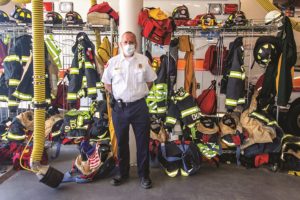TRURO — Voters here will be asked to permanently increase the town budget on June 30 so it can hire four new firefighter-paramedics, a move that would beef up the local ambulance service should the Lower Cape Ambulance Association (LCA) be dissolved.
If approved at both the June 30 annual town election and the Sept. 15 annual town meeting, the proposal will add $351,904 to the fire dept. budget, currently $983,383. It would grow the staff by almost 50 percent, from 9 to 13, including the chief. It would cost the owner of a $500,000 home an additional $75.89 a year in taxes, said Fire Chief Timothy Collins.
That is likely to be just the beginning of new fire department expenses. At the core of this move is the very real threat of losing LCA, the regional ambulance service shared with Provincetown that has existed since 1937.

For decades, the nonprofit has provided backup services to the two outermost towns. LCA transports patients to Cape Cod Hospital, a two- to three-hour commitment per trip. Every 911 call brings out both a town ambulance crew and an LCA crew. If a transport to the hospital is needed, Lower Cape does it, leaving the town crews available for other calls.
Though this system has worked in the past with support from the towns’ fire chiefs, that doesn’t appear to be the case anymore.
Provincetown Fire Chief Michael Trovato has said he wants to end his department’s relationship with LCA and hire his own town squad, using the $1.02 million that Provincetown has budgeted to pay LCA to add to his current staff and create a full-time department.
Truro is paying $430,000 to Lower Cape Ambulance in fiscal year 2020, said Collins. The amount proposed by the town to hire four people, $351,904 — plus the added ambulance expenses — comes to about the same $430,000. Therefore, if LCA collapsed tomorrow, Truro would pay about the same to have its own full-time rescue service.
But Truro still has two years left on its contract with LCA. So, once those four firefighters are hired, the town will be paying those new salaries in addition to LCA.
If LCA collapses, more staffing on top of the four new firefighters will be necessary, said Jan Worthington, chair of the select board. Having the four new firefighters on staff would allow three people to be on every shift. Currently, Truro has just two people on a 24-hour rotation. And it would bring the town’s paramedics from two to six, Worthington said. But that’s still not enough, even with mutual aid, she added.
Still, Worthington thinks the right thing to do is to slowly build up a full-time town rescue squad, given that there already is a small full-time department and that the relationship with Provincetown and LCA is on life support.
“It doesn’t make sense to have a full-time department and Lower Cape Ambulance,” she said. “You have to use your people to their utmost capacity. So, if you’ve got a full-time department, they can do transports.”
Ambulance transports actually bring in income through insurance reimbursement. Last year, Lower Cape Ambulance earned $952,551 in reimbursements for runs from the two towns, but it still needed the $1,246,091 it collected from the towns to pay its operating costs and salaries, said Steven Roderick, LCA’s chief operating officer and treasurer.
Mark Hatch, chair of the Provincetown Finance Committee, said LCA’s chief benefit is flexibility. The towns’ populations explode for a few months in the summer, which is when extra rescue staff is especially needed. This is when having an outside agency comes in handy, since you don’t have to pay a summer-size staff to sit around all winter.
But, Hatch added, Trovato is close to retirement age, and when he leaves, it is unlikely that anyone will be able to keep together Provincetown’s volunteer firefighting staff — who are not usually EMTs or paramedics but just people who jump into their trucks when they hear a fire tone.
That unique construct, nonexistent anywhere else on the Cape or possibly in the state, is largely the result of Trovato’s personal connections to his firefighters and his commitment to a traditional department like the one his father also led as chief.
“The thing is, Mike is going to retire and we’re going to have to hire a fire chief and professionalize the department,” Hatch said. “We’re working up to that slowly.”
For now, both Hatch and Worthington said in separate interviews that they support a hybrid situation that adds more town personnel and an adjusted contract with LCA, so that its service is needed but not as much.
Roderick, who leads Lower Cape Ambulance, said that full-time town departments won’t ever be as cost-efficient as using LCA.
One reason is overtime, he said. People who work part-time for Lower Cape Ambulance are also working full-time in Truro and Provincetown, Roderick said. “If you took our entity away and were not able to hire more people, overtime would increase on the municipal side,” he said.
Another reason is flexibility in hiring. LCA can hire people part-time who work full-time for other departments, Roderick said. “They are able to work for us, which means in an area where there is a shortage of qualified medics and EMTs, we are able to hire from a greater pool,” he said.



